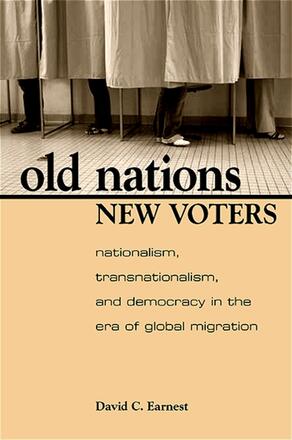
Old Nations, New Voters
Nationalism, Transnationalism, and Democracy in the Era of Global Migration
Alternative formats available from:
Groundbreaking empirical study of voting by resident aliens in established democracies.
Description
In this groundbreaking study, David C. Earnest analyzes why democracies give noncitizens the right to vote. Bringing together theoretical debates in international relations and comparative politics about globalization, sovereignty, nationalism, citizenship, and state building, he examines how twenty-five democracies are coping with growing populations of immigrants who increasingly demand political rights. Earnest employs statistical analyses, along with case studies, to uncover surprising facts—that national courts are not necessarily progressive and that the left-right differences of political parties disguise intriguing coalitions that may either welcome or marginalize immigrants. The author concludes that rather than undermining the rights of citizens, the enfranchisement of noncitizens reflects shared national myths. In this respect, when faced with growing migration, old nations welcome new voters in ways that reinforce the bond between the nation and state.
David C. Earnest is Assistant Professor of Political Science and International Studies at Old Dominion University and coauthor of On the Cutting Edge of Globalization: An Inquiry into American Elites.
Reviews
"In this thoughtful, well-written, tightly argued and methodologically rigorous book, David C. Earnest asks why a surprising number of liberal democracies grant voting rights to non-citizens or resident aliens. His query could not be more timely. " — Journal of Ethnic and Migration Studies
"This is a very ambitious study that builds on earlier scholarship on a relatively little-researched topic of great significance. The author crafts a model and empirically tests hypotheses. This is a major breakthrough in an area of mainly descriptive writing. " — Mark J. Miller, coauthor of The Age of Migration: International Population Movements in the Modern World, Third Edition
"The author's point that rights for aliens will be influenced in a significant way by the respective citizenship tradition is a welcome reminder for migration research. In addition, the book furthers our knowledge about the application of time-series cross-section design, and it introduces new ways of dealing with major errors in these types of studies. It is thus of interest to both migration researchers and researchers designing similar studies. " — Sabine Dreher, Near East University